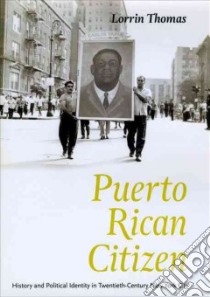Puerto Rican Citizen - 9780226796086
Un libro in lingua di Lorrin Thomas edito da Univ of Chicago Pr, 2010
- € 55.30
- Il prezzo è variabile in funzione del cambio della valuta d’origine
"Written with simple elegance and brilliantly engaged with the politics of dignity and recognition, Puerto Rican Citizen represents an important achievement---one that I am convinced will assume its rightful place among the best examples of scholarship on Puerto Rican history, Latino studies, and the broader history of citizenship. Engaging the history of the Puerto Rican diaspora, as well as the literature of race, imperialism, and national citizenship, Thomas lays the groundwork for a much-needed reconsideration of the significance of Puerto Ricans in the social history of the United States. Puerto Rican Citizen is a powerful work of original scholarship that should attract a broad audience among academic and general audiences alike." David Gutierrez, University of California, San Diego
"Lorrin Thomas's book is an extremely well-researched, clearly written, and impressive account of the struggle of Puerto Rican migrants and their offspring to take advantage of their status as U.S. citizens to gain political, economic, and social rights in the complex racial and ethnic landscape of New York City in the twentieth century. Thomas utilizes a vast array of archival materials, oral histories, community newspapers, and social science reports to chronicle this struggle, while vividly describing the raciallogic and liberalideology that avoided the implications of U.S. colonialism in the Caribbean to increasingly and consistently place Puerto Ricans on the `foreign' side of the immigrant spectrum despite the 1917 law granting them U.S. citizenship. This is an original and sensitive volume that will be an important addition to the growing scholarship on Latino history, appealing to a wide audience of scholars and students alike. I believe this book will become the standard work in the field, likely to be used throughout the nation for years to come to understand the Puerto Rican experience in the most important city of migration." George Sanchez, University of Southern California
"Lorrin Thomas tackles a topic that only seems familiar. The rise of Puerto Ricans as a political and economic force in New York City has been the subject of some very good, but hardly comprehensive scholarship. Thomas recasts the debate by boldly attacking an issue that is too often in the backdrop of the scholarship: the racial identities of Puerto Ricans in the United States. Especially strong when exploring the tensions and common ground between minorities, Thomas teases out the painful but informative histories of these groups and shows the ways in which traditional or preexisting ideas about color, status, success, and history informed the experiences of Puerto Ricans in New York. Throughout the book, Thomas's enthusiasm for breaking through this difficult subject matter shines through, and she makes balanced, nuanced, and insightful conclusions that will find their way into quite a few classrooms."Craig Wilder, Massachusetts Institute of Technology
By the end of the 1920s, just a decade after the Jones Act made them legally Americans, more than 45,000 native Puerto Ricans had left their homes and entered the United States, citizenship papers in hand, forming one of New York City's most complex and unique migrant communities. In Puerto Rican Citizen, Lorrin Thomas for the first time unravels the many tensions---historical, racial, political, and economic---that defined the experience of this group of American citizens before and after World War II.
Building its incisive narrative from a wide range of archival sources, interviews, and first-person accounts of Puerto Rican life in New York, this book illuminates the rich history of a group that is still largely invisible to many scholars. At the center of Puerto Rican Citizen are Puerto Ricans' own formulations about political identity, the responses of activists and ordinary migrants to the failed promises of American citizenship, and their expectations of how the American state should address those failures. Complicating ourunderstanding of the discontents of modern liberalism, of race relations beyond black and white, and of the diverse conceptions of rights and identity in American life, Thomas's book transforms the way we understand this community's integral role in shaping ideas about citizenship in twentieth-century America.
Informazioni bibliografiche
- Titolo del Libro in lingua: Puerto Rican Citizen
- Sottotitolo: History and Political Identity in Twentieth-Century New York City
- Lingua: English
- Autore: Lorrin Thomas
- Editore: Univ of Chicago Pr
- Collana: Univ of Chicago Pr (Hardcover)
- Data di Pubblicazione: 15 Giugno '10
- Genere: SOCIAL SCIENCE
- Argomenti : Puerto Ricans New York (State) New York Social conditions Puerto Ricans New York (State) New York Economic conditions Puerto Ricans New York (State) New York Politics and government
- Pagine: 354
- ISBN-10: 0226796086
- EAN-13: 9780226796086


